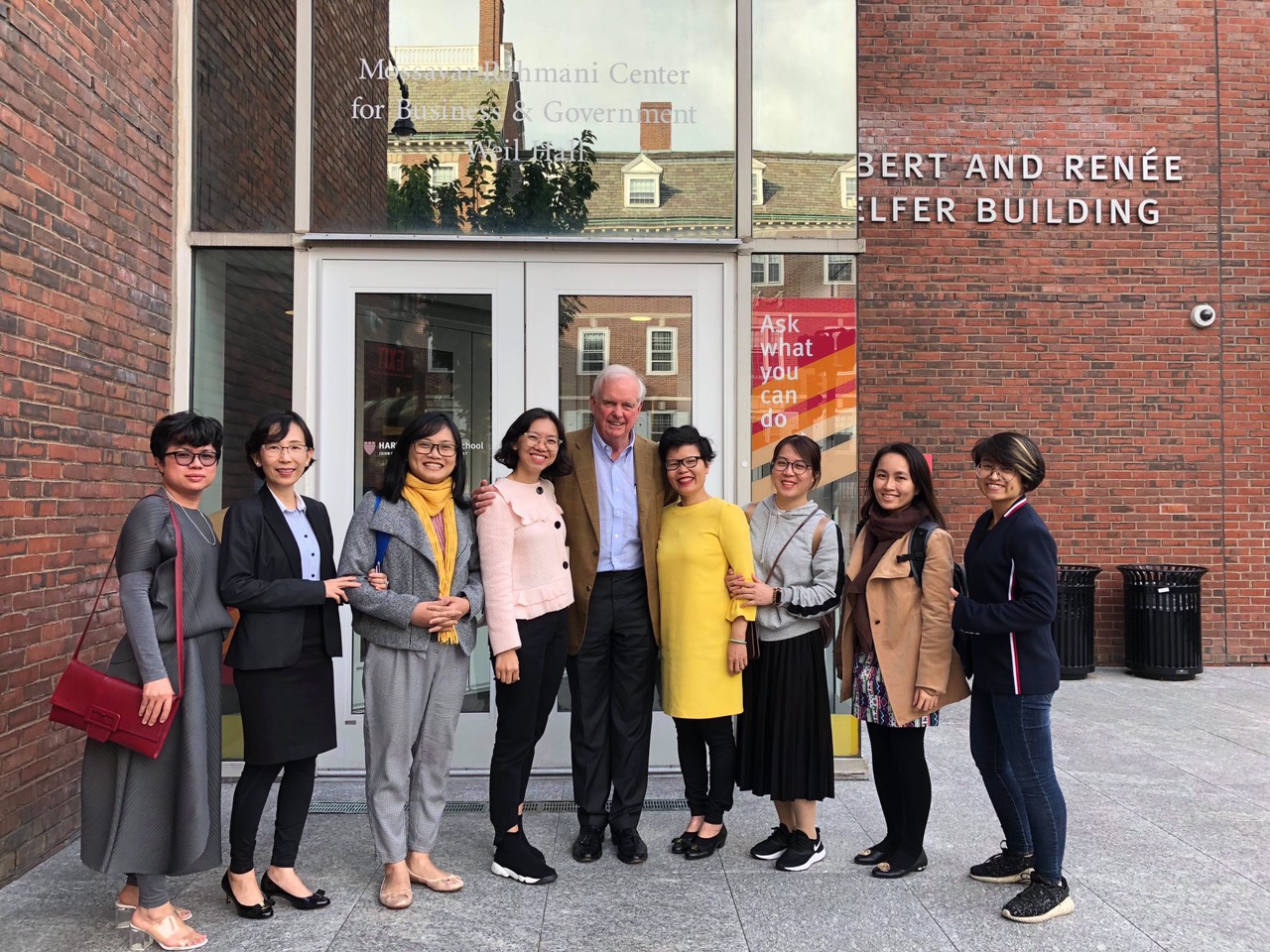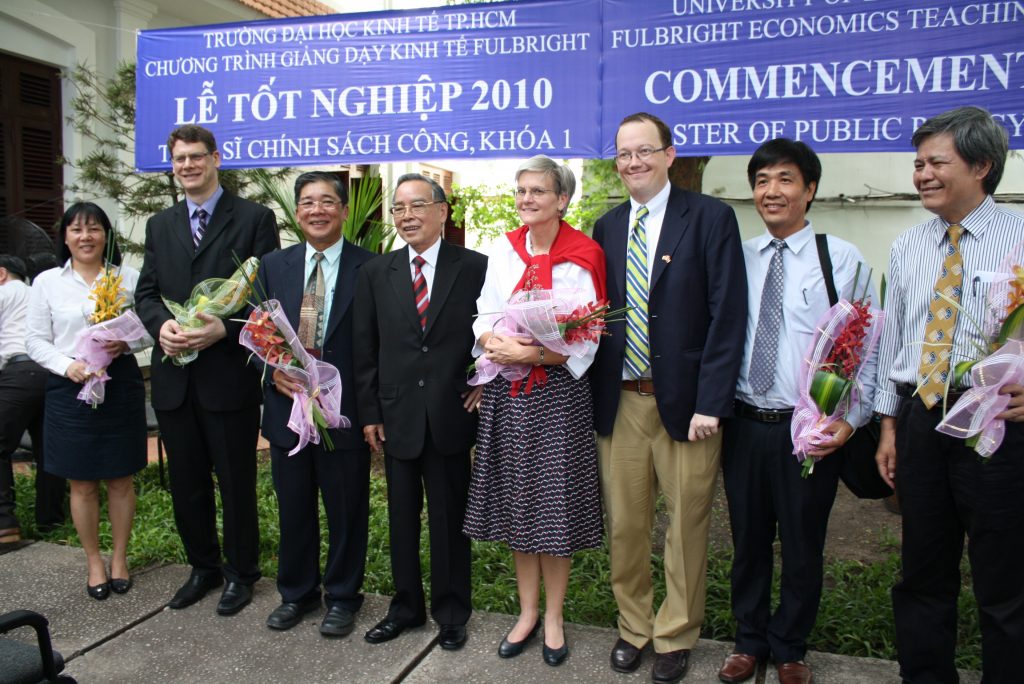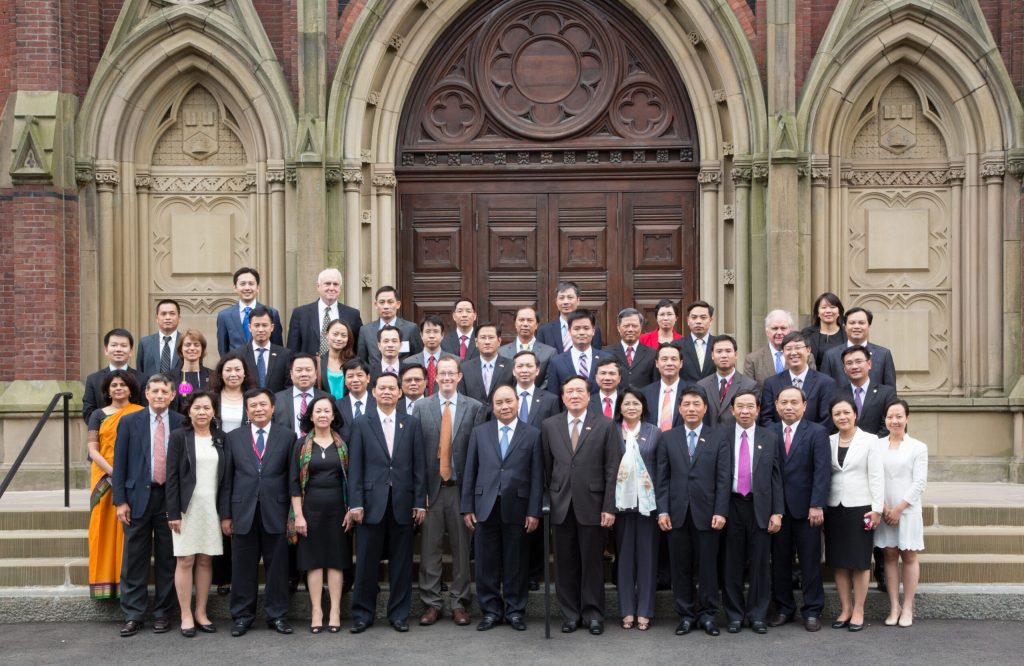
In 2010, during the graduation ceremony for Fulbright School’s first Master of Public Policy cohort, the late Prime Minister Phan Van Khai remarked that he himself had learned a lot, especially about the market economy, through discussions with a group of Harvard and Fulbright professors. Such knowledge, which he “successfully applied during his tenure, contributed to the development of the country”.
As the Prime Minister of Vietnam from 1997 to 2006, he was one of the technocratic leaders with the most substantial contributions during the country’s reforming and opening period. He also played an influential role in establishing the Fulbright Economics Teaching Program, the predecessor of the Fulbright School of Public Policy and Management at Fulbright University Vietnam today.
His deep connection with the Fulbright School stemmed from a study trip to learn economic reform lessons from East Asian countries, organized by a group of Harvard professors who founded the School in the early 1990s. At the time, Mr. Khai was the Vice Chairman of the Council of Ministers (the equivalent position to the current Deputy Prime Minister). He and other senior officials in charge of the economic sector in the state apparatus then learned methodically for the first time the core pillars of the market economy – from supply and demand, prices, exchange rates, to the import-export mechanism – concepts that were still extremely foreign to those who had just come out of the centrally planned economy.


The then Prime Minister Phan Van Khai attended the graduation ceremony of the inaugural Master Public Policy cohort
Although the Doi Moi process started in 1986, “Vietnam’s development programs, guidelines and strategies were still very vague and exploratory” because “very few people understood the principles of economics,” recalled Professor Thomas Vallely, Director of the Vietnam Program at Harvard University, who organized the study trip that year.
The impression from this trip was so profound that later on, Mr. Khai became an avid advocate for the idea of a training program in applied economics for Vietnamese leaders and officials taught by Harvard professors, at a time when the relations between the two countries still had not fully normalized.
That was because Mr. Khai, along with other visionary Vietnamese leaders at that time, understood that more than ever, the country needed leaders with knowledge and a market economy mindset in order to successfully lead the transition from a centrally planned economy to a market economy.
Later, Dr. Jonathan Pincus, Director of FETP from 2008 to 2013 noted that FETP “was an excellent idea born at the right time”.
“A factor that shaped the Fulbright School in its early days was the emergence of Asian economies and the aspiration of Vietnamese leaders to be a part of the historic movement where the economic center of the world shifted from West to East,” said Mr. Pincus.
Overcoming numerous obstacles and challenges from both sides, eventually, Ho Chi Minh City, which had been considered a “laboratory” for innovative ideas in the early Doi Moi period, was chosen to be home to a Harvard training program. In January 1995, the Fulbright Economics Teaching Program (FETP) was officially established, only half a year before Vietnam and the United States normalized diplomatic relations.


Dr. Jonathan Pincus, Director of FETP 2008-2013
Foreseeing Vietnam’s path of reformation
When the Fulbright School was established, the founders faced different choices and they made strategic decisions that set Fulbright apart from any other economic or political training program in Vietnam even later on. It was a decision to not target central-level officials like the typical approach, but to focus on modern economic knowledge and improving management capacity for local government officials instead.
“In the early 90s of the last century, access to modern economic management knowledge was a luxury for local officials,” explained Mr. Vallely.
This decision of the Fulbright founders also came from keen observations of Vietnam’s reform trajectory when Mr. Vallely and his partner, Professor Dwight Perkins, Director of the Harvard Institute for International Development, visited Vietnam and did a survey here in 1989. They found that Vietnam’s crucial national economic reform was largely driven by local reformations, which were later often described as a journey to “tear down” the old mechanism from the bottom up.
“These ‘jumping the fence’ actions, such as the discreet ‘agricultural land allocation’ movements in localities on the verge of renovation were meant to ‘emancipate’ production and business activities that have been suppressed for too long in the old mechanism. These reforms were successful because they precisely hit local pressure points. When central-level leaders observed that these experiments succeeded locally, they felt confident and bold enough to enact them into national policies,” Dr. Vu Thanh Tu Anh, Director of the Fulbright School of Public Policy and Management, explains.

Professor Thomas Vallely, Director of the Vietnam Program, Harvard University and Harvard University President Catharine Drew Gilpin Faust at the Fulbright Economics Teaching Program in Ho Chi Minh City.

Professor Thomas Vallely and students from the Fulbright School of Public Policy and Management during a short course at the Harvard Kennedy School.
According to Dr. Tu Anh, FETP’s decision to focus on training local officials, therefore, showed ‘a deep understanding of the reform trajectory in Vietnam’ and such incredible ‘foresight’ that even to this day, he still feels truly fascinated and grateful about.
As a result of that strategic decision, a community of more than 1500 alumni from 62 out of 63 provinces in Vietnam has become an invaluable asset of FSPPM today. They have contributed to forming an excellent class of officials and civil servants of Vietnam in the Doi Moi era, pioneers who created positive change in their own communities.
Mr. Seth Winnick, U.S. Consul General in Ho Chi Minh City, shared a story with Dr. Vu Thanh Tu Anh which happened more than 10 years ago. Whenever he went to localities in Vietnam and met Fulbright alumni, he could recognize them almost immediately by their distinct expression of the “Fulbright DNA”. He even coined the term “FETP Index” – a province with a high index means there are many FETP alumni working there and they are definitely at the forefront of innovation and reform in Vietnam.
The outstanding contributions of FETP alumni didn’t just take place locally. Many people, after serving in the leadership role of a particular province or department, have been promoted to the Central Government to lead the planning and implementing of important policies at the national level.

In 2013, Mr. Nguyen Xuan Phuc, then Deputy Prime Minister, led a delegation of high-ranking Vietnamese officials to attend the Vietnam Executive Leadership Program (VELP) – a joint initiative of the Vietnamese Government, the United Nations Development Program (UNDP), the Vietnam Program at Harvard University, and FETP.
Global knowledge – local action
When it first started, FETP did exactly what was “requested” by the Government of Vietnam at that time, which was to impart the most up-to-date knowledge on market economy to state officials, in accordance with the context of the country.
“We then taught neoclassical economics courses the way you would at Harvard, with the Harvard Kennedy School’s curriculum being translated into Vietnamese in a way that was easy to understand,” recounted Mr. Thomas Vallely.
Mr. Cao Van Trong, former Chairman of Ben Tre province was one of the first students of FETP. Before entering in the program, he had already obtained a bachelor’s degree in industrial economics from the Ho Chi Minh City University of Economics. However, a year at FETP for him was an entire journey of “reconstruction”, from his knowledge to vision and thinking.
“We learned very new knowledge about micro- and macro-economics, about the economy management tools, especially the two very important tools in the market economy: fiscal and monetary policies. But the most significant thing that I learned from Fulbright is the approach and mindset that dissects an issue from many different angles. That is a timeless value,” said Mr. Trong.

Taking it a step further, when FETP has built trust with the society and with the government system, the lecturers were able to boldly put real Vietnamese practices at the heart of the training program. Harvard’s famous “case study” method was modified by the lecturers to suit the Vietnamese context, which Dr. Vu Thanh Tu Anh often likened to the journey of “Vietnamizing global knowledge”.
2008 marked a historic milestone for FETP when it changed from a 1-year applied economics training program to a 2-year master’s degree program in public policy – the first Master in Public Policy program in Vietnam. Transcending the framework of a traditional economic training program, the School had begun to venture into the “sensitive” but increasingly urgent issue in Vietnam: public policy, public management, and public administration.
That was because, as explained by Dr. Vu Thanh Tu Anh, after more than 20 years of renovation and integration into the global economy, Vietnam had entered a period when the old driving forces of growth had gradually become outdated and required the apparatus to introduce drastic reforms, especially in terms of institutions. The decisions were no longer simply to “emancipate” from the old mechanism as before, these reforms must be relevant to the vivid, creative, and multi-dimensional realities in the drastically changing context of Vietnam and the world.

Former Trade Minister Truong Dinh Tuyen was one of the regular visiting lecturers of the Fulbright Economics Teaching Program.
In order to solve these increasingly complex policy problems, leaders and executives needed to be equipped with new knowledge and mindsets. Therefore, Fulbright School’s faculty members have made constant efforts to create new knowledge that caters to the needs of the time. There are Fulbright “specialty” subjects such as Regional and Local Development, Public Investment Appraisal, Law and Public Policy… Every lesson at the Fulbright School has now turned into lively discussions about practical problems facing Vietnam.
From environmental and energy policy for the Mekong Delta region, to the strategy to promote infrastructure development projects following the public-private partnership (PPP) model, or even the strategy to build Thu Duc into a smart city, each graduation thesis of Fulbright students has been very practical policy analysis that they can continue to pursue after returning to their daily work.

Dr. Vu Thanh Tu Anh and students of the Fulbright School of Public Policy and Management during a field trip to study about Regional and Local Development in Hue
According to a veteran Vietnamese diplomat, it is the journey of engaging in the center of socio-economic development of Vietnam over the past 25 years, reflected in the constant efforts to update the curriculum to accommodate the needs of the community and provide the country with high-quality human resources has helped “Fulbright to become the only international educational exchange program that still continues to reach new heights”.
While other projects came to an end, FETP has now become the Fulbright School of Public Policy and Management (FSPPM), one of the first 10 public policy schools in Asia and the first in Southeast Asia to achieve accreditation from NASPAA – the “golden standard” of public policy, public management, and public administration schools around the world.
When they put down the first bricks to begin the construction of a humble school, located in a small alley on Vo Thi Sau Street, the founders of FETP could not have expected that it would go this far. Right now, Fulbright is not only “the most important educational legacy in the Vietnam-US relations”, but also an “invaluable intellectual property” of Vietnam.
Viet Lam







